When there were events to commemorate the 100th birthday of the late President Ronald Reagan on Feb. 6, 2011, the media ignored the fact that Reagan was a lifelong member of the Disciples of Christ, a small denomination also known as “The Christian Church.”
Incredibly, the Disciples of Christ, whose 910,000 members in the U.S. rank as only 0.33% of the American population, have had three members as U.S. Presidents: James Garfield, Lyndon Johnson and Ronald Reagan.
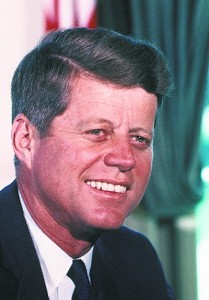
Despite 24% of the U.S. population being Catholic, John F. Kennedy, who was elected in 1960, has been the only Catholic president. Of course, two other Roman Catholics have earned the nomination of a major party. New York Gov. Alfred E. Smith was the Democratic nominee in 1928 and was defeated by Republican candidate Herbert Hoover, while U.S. Sen. John F. Kerry of Massachusetts won the 2004 Democratic presidential nomination and was defeated by President George W. Bush.
Joe Biden ranks as the first Catholic to serve as Vice President; however, the first Catholic to be selected for the vice presidential slot by one of the major two parties was former New York congressman William E. Miller who was chosen to be Barry Goldwater’s running mate on the 1964 Republican ticket, while four years later 1968 Democratic nominee Hubert H. Humphrey selected U.S. Sen. Edmund Muskie, a Catholic, to be his running mate.
R. Sargent Shriver, a brother-in-law of President Kennedy, was selected by Sen. George McGovern, the 1972 Democratic presidential nominee, to be his running mate. Congresswoman Geraldine Ferraro of New York City, who was the first woman ever to be selected as vice presidential nominee by a major party, was chosen by Walter Mondale to be his running mate in 1984. Miller, Muskie, Shriver and Ferraro all were on unsuccessful tickets.
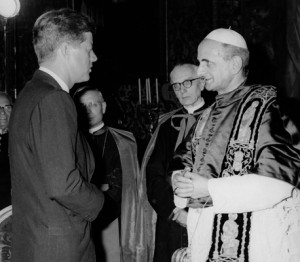
Surprisingly, former Alaska Governor Sarah Palin, selected by Senator John McCain to be his running mate on the 2008 Republican ticket, was actually baptized as a Catholic but shortly afterwards her family left the Catholic Church and began to attend non-denominational Christian churches.
The fact that there have been three presidents who were members of The Disciples of Christ is a sense of pride for many of the denomination’s faithful. Elizabeth Ann Raymond, who lives in New York and grew up in Virginia, has been a Disciple of Christ for her entire life. “I know we are a small group compared to other Christian denominations, but to have three of our members elected president of the United States is a great and quite unique accomplishment when you take our small numbers into consideration,” she said. “My family was definitely proud of both Lyndon Johnson and Ronald Reagan.”
The Disciples of Christ have 17 colleges and universities in the U.S. Among them are Lynchburg College, Eureka College, Hiram College and Texas Christian University.
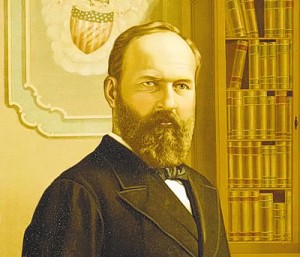
James Garfield attended Western Reserve Eclectic Institute, a Disciples of Christ college that was later renamed Hiram College, and graduated from Williams College in Williamstown, Mass. As a young man, he preached and held revival meetings in Disciples of Christ churches. Garfield, a Republican, was elected in 1880, but only served from March 4, 1881 to Sept. 19, 1881 because he was assassinated by Charles J. Guiteau. He is the last president to have been elected directly from the House of Representatives. Countless members of the House of Representatives have run for president since 1880 and all have been unsuccessful.
Lyndon Johnson, the 36th president of the United States, who served from 1963 to 1969, was a Disciple of Christ for all of his adult life. Originally raised in the Baptist faith, at age 15 he became a lifelong Disciple of Christ after being baptized in 1923 after attending a summertime revival meeting at a church in Johnson City, Texas.
The teenage Johnson said that the beliefs of the Disciples were more in accordance with his own views than was the Baptist faith of his family. Though a devoted Disciple of Christ from his late teen years to his death, Johnson and his wife, the former Claudia “Lady Bird” Taylor, were married in an Episcopal (Anglican) church in San Antonio in 1934; throughout their 49-year marriage, Johnson would from time-to-time accompany his wife to services at Episcopal churches.
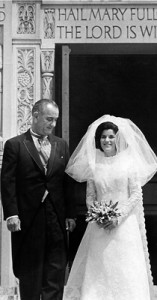
Similarly, when Luci, one of his two daughters, converted to Catholicism at age 18 in preparation for marriage to her Catholic fiancé, President Johnson was known to frequently accompany his daughter to Mass on Sundays.
Johnson, who was sworn in as president with his right hand on a Catholic Bible, frequently made unreported nocturnal visits to St. Dominic’s Church in Washington; after Johnson’s death there were reports that his daughter Luci had urged him to pray to her “little monks” at St. Dominic’s for guidance in his handling of the Vietnam War.
Luci Johnson and Patrick Nugent were married in a high-profile ceremony during her father’s presidency at the Shrine of the Immaculate Conception, later made a Basilica in 1990, in Washington, D.C. The wedding marked the first time that a president had ever visited the Shrine. The couple had four children, were divorced, and their marriage was annulled by the Catholic Church in August, 1979.
While at his Texas ranch both during his presidency and afterwards, Johnson would occasionally attend Sunday Mass at St. Francis Xavier Catholic Church in his hometown of Stonewall and then attend a Disciples of Christ service on the same day. The priest at St. Francis Xavier was Father Wunibald W. Schneider, who was a professed brother in Germany and went to serve in Ireland for 11 years where he decided to make the step to study for the priesthood there, later becoming an Irish citizen. Father Schneider has long been reported to have been a close confidant and advisor to President Johnson, both on personal and political matters, during his presidency and afterwards. While Johnson was a totally committed Disciple of Christ, he always treasured the times when he would attend Episcopal and Catholic services.
Twelve years after Lyndon Johnson left office, another Disciple of Christ, Ronald Reagan was sworn in as the nation’s 40th president in January, 1981. Reagan was the product of a mother who was a Disciple of Christ and a father who was Catholic. Reagan was baptized in his mother’s faith and remained a Disciple of Christ throughout his adult life, though he attended services at a Presbyterian church in the final 12 years of his life and became a dues paying member of the Bel Air Presbyterian Church in Bel Air, Calif., with his funeral service held at that church.
Ronald Reagan graduated from Eureka College in Eureka, Ill., which was run by the Disciples of Christ. Ironically, his older brother, Neil, was baptized a Catholic and although he attended a few Disciples services with his mother early on, he affirmed his Catholic faith in his youth and was a lifelong practicing Catholic who was active in the Church.
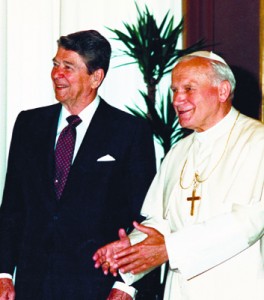
Neil “Moon” Reagan began his career as a producer in the early days of television in California, and then had almost a 30-year career in advertising with McCann-Erickson Worldwide, retiring as the Senior Vice President of the agency’s Los Angeles office. He died in 1996 at the age of 88.
Ironically, Ronald Reagan’s first wife, actress Jane Wyman, from whom he was divorced in 1949, converted to Catholicism in 1953 and later became a Third Order Dominican and was buried in a nun’s habit at the time of her death in 2007. Reagan and Wyman’s daughter Maureen was raised Catholic following Wyman’s conversion and graduated from Immaculate Heart H.S., a prestigious all-girls school in Los Angeles run by the Sisters of the Immaculate Heart of Mary. Maureen was buried from the Cathedral of the Blessed Sacrament in Sacramento in 2001 upon her death at age 60 from melanoma.
The website adherents.com provides a condense history of the Disciples of Christ, stating that it emerged from the American restoration movement that sought to re-establish “Biblical practices” among Protestant churches. The followers of Thomas Campell and Barton W. Stone joined forces in 1832 to form what was known as the Stone-Campbell Movement, but in 1906 theological differences among the church’s members caused a split, with followers of Campbell’s original ideas forming “The Churches of Christ,” while adherents to Stone’s ideas formed “The Disciples of Christ,” a term that had been previously used by some members prior to the official split.
Maureen Mulready, a Catholic who lives in Westchester County, and is a native of Liverpool, England, heard of the Disciples of Christ in England because famed British Prime Minister David Lloyd George was a member of the denomination. Having been in the U.S for four presidential elections, she said, “I cannot fathom that a tiny group like the Disciples of Christ have had three presidents and there has only been a single Catholic president. Then again, I don’t think religion matters to Catholic voters in the U.S. My husband and I know many people who are Catholic, both Democratic and Republican, and never once have we ever heard any of them say, ‘I am going to vote for that candidate because he is Catholic.’ As a foreigner, it appears to me that we live in a far different era than the ones in which Al Smith and John Kennedy ran for president.”
Father Paul R. Fagan, C.P., a Passionist priest based in Westchester County, feels that the question of there only being one Catholic president has to be examined in both a historical and modern perspective. “I guess that I am not all that surprised that there has been only one Catholic president even though we might make up 21% of the population,” he said.
“I think that for a long time the culture of our country was suspicious of the Catholic Church. I think there was a fear that if a Catholic were made president that he and the pope would have too much power together. I also think that Catholic politicians remained more local in their work perhaps feeling more comfortable in a smaller setting rather than the national stage. I think our, the Church’s, struggle to be accepted is not unlike other groups that have been represented by a president, whether it be women, African-Americans, women, Jewish people and others. Sometimes it is just fear about someone or something that we do not understand,” he said.
Paul Sanchez writes from Westerly, Rhode Island.
